Lori’s new job is at the Ambatovy International School, which is part of Ambatovy, a modern nickel and cobalt mine put together by a partnership of Canadian, South Korean, and Japanese companies.
So we’re setting up home in Madagascar.
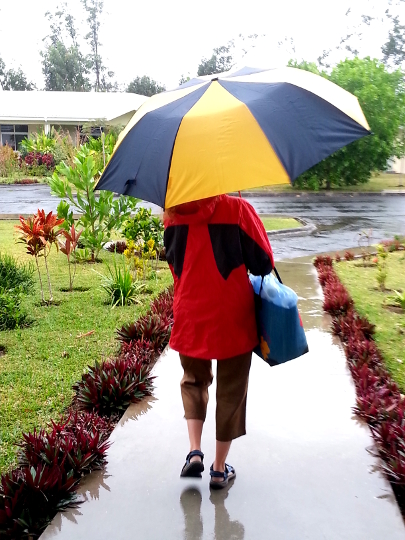
Ethnic Malay people were the first humans to settle Madagascar some 2,000 years ago. We feel a bit like we’re following them as we’re coming from Malaysia ourselves where Lori worked at an international school in Kuala Lumpur.
Some interesting things about our new home. Madagascar is an island off the southeast corner of Africa in the Indian Ocean and is the fourth largest island in the world. 90% of the wildlife, including over 100 kinds of lemurs, and 80% of plants here are found nowhere else in the world. About 23 million people live in Madagascar and 90% of them live on less than two dollars per day.
We live in a village near Toamasina on Madagascar’s east coast. Toamasina is the second largest city in Madagascar and is also known as Tamatave. The former is the Malagasy name and the latter the French. All the locals call it Tamatave. About 275,000 people live in town. We live about 8 kilometers (5 miles) south of the city.
Our village is called Tapakala, which is Malagasy for the cut forest. We’re in a wooded area, a lot of which was cut to build the houses. There’s a security wall topped with concertina wire all the way around the village. That’s kind of telling about life here. And just 200 meters out the east gate is the beach and the Indian Ocean. Nice.
Our village a company housing area is officially named the Management Housing Village. I’ll stick with Tapakala. That name has a lot more character.
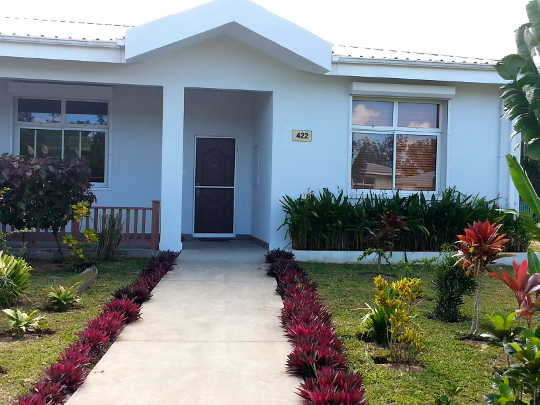
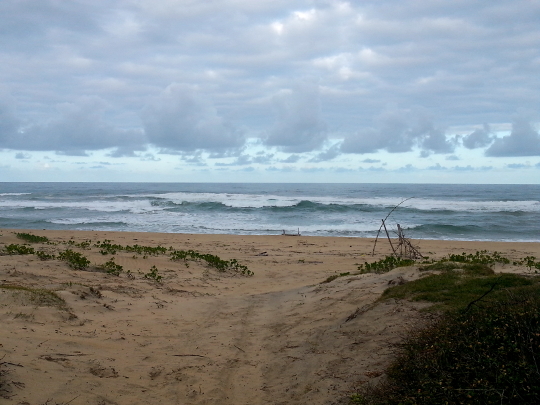

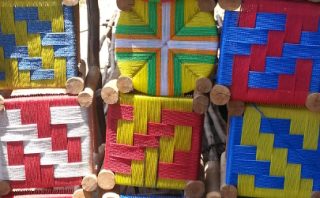
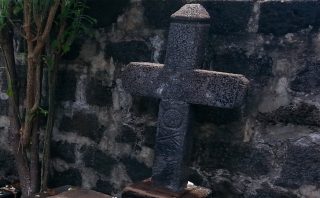
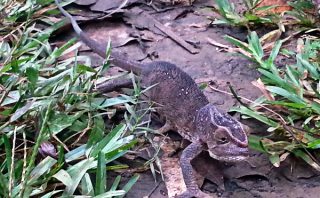
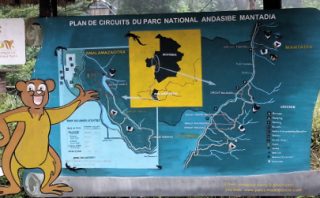
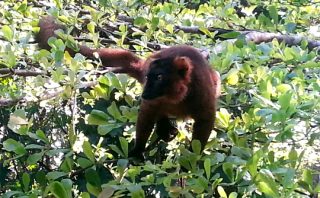

Hi. My husband works there and we are moving there as a family of three. We have a small daughter aging one.
Is the school there has kindergarten and what’s the joining age for kid? Is it Montessori education?
I am sorry for the delay in getting back to you. I haven’t checked on this blog for a few months. The school used to have a kindergarten, don’t know if they still do. In the past, the cirriculum was not Montessori. I’ve heard the school has re-opened but everything’s changed. Something about emphasis on French. Maybe you’re there already and can tell us what the school is like now?
Hello
I was wondering a bit more about Tapakala and what sort of amenities are available. Do you need to go into Toamasina for most things. Also how safe do you feel in the area?
Tapakala? Well, I understand there are two Tapakalas. The area called Tapakala by the Malagasy including a Malagasy village by that name, and the Ambatovy Management Housing Village, also called Tapakala.
Amenities? The Malagasy Tapakala would not have what a person from a developed country would call amenities; the Management Housing Village has them (running water, indoor plumbing, electricity, internet, air conditioning, paved roads, swimming pool, tennis courts, fitness center, and more). One could hole up in the Management Housing Village, eat at the cafeteria, recreate there, and venture out only to get to the airport and travel somewhere else. A few people did that. Most didn’t. My wife and I liked Madagascar and the Malagasy, so we went to Toamasina for grocery shopping, restaurants, music and dance performances, Malagasy classes, visiting friends, and more.
Safety? Well, we haven’t lived there for two years now. However, when we were there, inside the Management Housing Village was very safe and secure. This was a priority for Ambatovy and I would think still is. If you come from a developed country, you are perceived as a very wealthy person. You are a target so to speak for beggars and criminals. You could be stopped by police and asked for a “gift.” I always felt like I managed my own safety and security. Situational awareness is always important. Safe practices are important like drinking bottled water not tap water, washing hands or using hand sanitizer, being selective about where and what you eat, carrying a first aid kit, having malaria meds with you on trips, and that sort. Secure practices are important like knowing where not to go, not being out late at night especially in “bad” parts of town, not having lots of cash on you, keeping things out of site/locked up inside of cars, making sure your driver stays with your car, going to the beach with a group, etc.
Hope this helps.
I am so glad that I came across this article! My husband and I have been thinking about going on a photo tour around Madagascar so this information will be really helpful! We are really excited to start planning our trip so we will be sure to keep this advice in mind, thanks for sharing!
Hello! My husband is currently in talks with the school and I am also a traveler/writer who follows him around the world as he teaches 🙂 Like a few other commenters, we are hoping to understand a little more about daily life at Ambatovy. Would appreciate any insight you or Lori can offer! Thanks in advance!
A fellow teacher trailing spouse and travel writer? What are the odds of that? I checked out your blog, WanderLustLogs.org. Good stuff. I can’t tell you much about daily life at Ambatovy or Ambatovy International School since I don’t work there. I can tell you a bit about daily life here in Tapakala and Toamasina. But I’ll send that as a personal message. I guess I really need to churn out my “what life is like here” stories.
Hello!!
I am looking into Ambatovy for this upcoming school year and was wondering if you had any advice or insight into living on the compound or in Madagascar in general? Difficulties or advantages? I know this post was originally from a while back, are you still currently there?
Thanks so much!
Yes, we are still in Madagascar. I’ll reply to your questions via personal message. I get this question now and then. Maybe it’s time to write a few posts about every day living in Toamasina.
Hello,
I was wondering how things were going at the school? My wife and I spent some time as Peace Corps volunteers just south of Moramanga. We are considering moving back to Madagascar (we love it) and as we are teachers, we were looking for a school. Is it flourishing?
Salama,
When were you here with the Peace Corps? I’ve pretty much only driven through the Moramanga area. Last time through, however, I stopped to buy some pineapple in a nearby village and some pottery in another. Seems like a nice area.
I was back in Oregon last October and went to a pub with my daughter and her boyfriend to watch some college football. Quite a fall weather treat when you haven’t had a fall for several years. We met up with a couple of her friends. One happened to have been in Peace Corps in Mada and the other a French NGO here, and both know a number of the American folks we’ve met here who connect with Peace Corps. Awesome small world moment.
From the spouse-in-tow’s point of view, I would say yes, the school is flourishing. The school just completed their accreditation last November! The student population is small and fluctuates somewhat as expat employees and families move on and new expat employees and families come in. The number of teachers is small as well with only five expat classroom teachers and about four specialists. The specialists are local Malagasy teachers that cover physical education, art, music, and French. I’ll put you in contact with the head of school via personal email.
Depending on how much you need to earn, where you’d like to live over here, whether you still speak Malagasy, and whether you speak French, there might be other teaching opportunities for you in Madagascar. I know there’s an American international school in Antananarivo. You might look them up. You might also contact the folks at HELP Madagascar via their website for more leads. Through HELP Mada’s school, they might have more contacts in the education field here than I do. I also know there are some French international schools over here as well.
Cheers!
Hi,
I’m considering this school and would love to email with your wife.
I’ll give your info to Lori and let her contact you via personal email.
Hi,
I am currently looking for a job in Madagascar. Please can you assist me.
Hi Terisha,
I really don’t have many contacts for job possibilities. If you’re interested in working for Amabatovy, I recommend you start with their website. However, I’ll reply via personal email with a bit more detail.
Very cool.
That’s a great picture of Maa. Nice post!